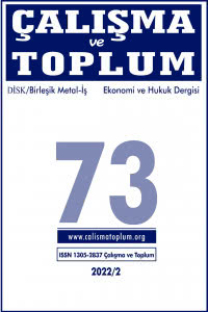Çalışma Hayatında İşe Uygunluk Değerlendirmesi
işe uygunluk, iş ve meslek hastalıkları uzmanlığı, iş sağlığı
Assessing fitness to work in working life
___
- Ağır ve Tehlikeli İşler Yönetmeliği (Yürürlükten Kaldırılan) (16.06.2004). Resmi Gazete sayı:25494.https://www.ttb.org.tr/mevzuat/index.php?option=com_content& view=article&id=207:ar-ve-tehleller-yetmel&catid=2:ymelik&Itemid=33 (24.09.2020)
- Anema, J. R., Jettinghoff, K., Houtman, I., Schoemaker, C. G., Buijs, P. C., ve Van Den Berg, R. (2006). Medical Care of Employees Long-Term Sick Listed Due to Mental Health Problems: A Cohort Study to Describe and Compare the Care of the Occupational Physician and the General Practitioner. Journal of Occupational Rehabilitation, 16(1), 41–52. https://doi.org/10.1007/s10926- 005-9001-4
- Beatty, J. (2018). Chronic Illness Stigma and Its Relevance in the Workplace. Içinde: Thomson S., Grandy G. (ed) Stigmas, Work and Organizations (pp. 35–54). New York: Palgrave Macmillan. https://doi.org/10.1057/978-1-137-56476-4_3
- Beyan, C., Demiral, A. ve Erdal, Y. (2020). Stigma toward Worker with Occupational Diseases: A Qualitative Study. Anatol J Family Med, 3(1), 31–39. https://doi.org/10.5505/anatoljfm.2019.14633
- Bilir N. (2016). İş Sağlığı ve Güvenliği (1. edisyon). Ankara: Güneş Tıp Kitabevi.
- Black, D. C. (2012). Completion of the Statement of Fitness for Work. Clinical Medicine, Journal of the Royal College of Physicians of London, 12(1), 7–8. https://doi.org/10.7861/clinmedicine.12-1-7
- BOHS (2020). Guidance for Members and nonHealthcare Businesses. https://www.bohs.org/wp-content/uploads/2020/07/Return-To-WorkGuide-July-2020-min.pdf (28.09.2020)
- Byng, R., Wheat, H. ve Barnes, R. K. (2015). Fit for work?: How GPS’ Decisions About Fitness to Work Can İmprove Health. British Journal of General Practice, 65(636), 338–339). https://doi.org/10.3399/bjgp15X685549
- Canadian Human Rights Commission (2007). A Guide for Managing the Return to Work. https://www.chrc-ccdp.gc.ca/eng/content/guide-managing-returnwork (28.09.2020)
- Coggon, D. ve Palmer, K. T. (2010). Assessing Fitness for Work and Writing a “fit note” Europe PMC Funders Group. BMJ, 26. www.icmje.org/coi_disclosure.pdf
- ILO (1996). Recording and Notification of Occupational Accidents and Diseases. https://www.ilo.org/wcmsp5/groups/public/---ed_protect/---protrav/--- safework/documents/normativeinstrument/wcms_107800.pdf (08.06.2020)
- ILO (1998). Technical and Ethical Guidelines for Workers’ Health Surveillance. https://www.ilo.org/wcmsp5/groups/public/---ed_protect/---protrav/--- safework/documents/normativeinstrument/wcms_177384.pdf (24.09.2020)
- IPIECA ve IOGP (2011). Fitness to work: Guidance for company and contractor health, HSE and HR professionals. OGP Report No. 470. London. https://www.ipieca.org/resources/good-practice/fitness-to-work/
- İş Sağlığı ve Güvenliği Kanunu (30.06.2012). Resmi Gazete sayı: 28339. https://www.mevzuat.gov.tr/MevzuatMetin/1.5.6331.pdf (24.09.2020)
- İş ve Meslek Hastalıkları Uzmanları Derneği, http://imud.org.tr/BULTEN.html
- İşyeri Hekimi ve Diğer Sağlık Personelinin Görev, Yetki, Sorumluluk ve Eğitimleri Hakkında Yönetmelik (20.07.2013). Resmi Gazete sayı: 28713. https://www.mevzuat.gov.tr/mevzuat?MevzuatNo=18615&MevzuatTur=7& MevzuatTertip=5 (24.09.2020)
- Karadağ, Ö.K. (Haziran 2017). Yüksekte Çalışma [Sunu slaytı]. Yüksekte Çalışma Çalıştayı. Ankara. https://docplayer.biz.tr/53326486-Yuksekte-calisma-haziran2017-ankara-dr-ozkan-kaan-karadag-md-is-sagligi-bilim-uzmani-msc-kamuyonetimi-bilim-uzmani-msc.html (01.09.2020)
- Kişisel Verilerin Korunması Kanunu (07.04.2016). Resmi Gazete sayı: 29677. https://www.mevzuat.gov.tr/MevzuatMetin/1.5.6698.pdf (24.09.2020)
- Knauf, M. T. ve Schultz, I. Z. (2016). Current Conceptual Models of Return to Work. İçinde: Handbook of Return to Work (pp. 27–51). New York, Springer. https://doi.org/10.1007/978-1-4899-7627-7_2
- L Alessio, L. D. C. (2004). Collaboration Between the Cardiologist and the Occupational Health Physician Needed for Formulating the Etiological Diagnosis and the Job Fitness Evaluation. Med Lav, 95(2), 98–103. https://pubmed.ncbi.nlm.nih.gov/15218740/
- Lorenzo D, Metrio D, Francesco G. ve Pirris A, G. M. (1999). Criteria and modalities of Assessment of Work Fitness for Jobs in Food İndustry. Med Lav, 90, 473– 483. https://pubmed.ncbi.nlm.nih.gov/10434529/
- McNamara, R. J., McKeough, Z. J., McKenzie, D. K. ve Alison, J. A. (2014). Physical Comorbidities Affect Physical Activity in Chronic Obstructive Pulmonary Disease: A Prospective Cohort Study. Respirology, 19(6), 866–872. https://doi.org/10.1111/resp.12325
- Müller, M. J. (2008). Occupational Health Physician. Netherlands, Springer (pp. 1028– 1029). https://doi.org/10.1007/978-1-4020-5614-7_2401 (25.09.2020)
- Nemarnik, R. E. ve Macan, J. (2018). Employment Status of Workers with a Diagnosed Occupational Disease in Croatia: A 10-year trend (2005-2014). Arhiv Za Higijenu Rada i Toksikologiju, 69(3), 220–225. https://doi.org/10.2478/aiht-2018-69-3132
- Noh, S. R. (2010). Availability of the 6-min Walk Test in Coal Workers’ Pneumoconiosis Evaluations. Chest (Vol. 137, Issue 6, pp. 1492–1493). https://doi.org/10.1378/chest.10-0070
- OSHA (2015a). Fit2work: Austria. https://osha.europa.eu/en/publications/austriafit2work/view
- OSHA (2015b). The Danish National Return-To-Work Programme: Denmark. https://osha.europa.eu/en/publications/denmark-danish-national-return-work programme/view
- OSHA, https://www.osha.gov/safetypays, 2020.
- Peckham, T. K., Baker, M. G., Camp, J. E., Kaufman, J. D. ve Seixas, N. S. (2017). Creating a Future for Occupational Health. 61(1), 3–15. https://doi.org/10.1093/annweh/wxw011
- Preisser, A. M., Zhou, L., Garrido, M. V. ve Harth, V. (2016). Measured by the Oxygen Uptake in the Field, the Work of refuse Collectors is Particularly Hard Work: Are the Limit Values for Physical Endurance Workload Too Low? International Archives of Occupational and Environmental Health, 89(2), 211–220. https://doi.org/10.1007/s00420-015-1064-8
- Schultz, I. Z., Chlebak, C. M. ve Stewart, A. M. (2016). Impairment, Disability, and Return to Work (pp. 3–25). https://doi.org/10.1007/978-1-4899-7627-7_1
- Serra, C., Rodriguez, M. C., Delclos, G. L., Plana, M., Gómez López, L. I. ve Benavides, F. G. (2007). Criteria and Methods Used for the Assessment of Fitness For Work: A Systematic Review. In Occupational and Environmental Medicine (Vol. 64, Issue 5, pp. 304–312). BMJ Publishing Group. https://doi.org/10.1136/oem.2006.029397
- Soleo, L., Romano, C. ve Apostoli, P. (2006). Fitness For Work: The SIMLII Health Surveillance Guidelines. Medicina Del Lavoro, 97(3), 491–500.
- Şimşek C. (2019). IMUD Bülten (1). http://imud.org.tr/BULTEN.html
- T.C. Anayasası (09.11.1982). Resmi Gazete sayı: 17863. https://www.mevzuat.gov.tr/MevzuatMetin/1.5.2709.pdf (24.09.2020)
- T.C. Cumhurbaşkanlığı Mevzuat Bilgi Sistemi, 2020, https://www.mevzuat.gov.tr/
- Türk Kardiyoloji Derneği Ulusal Hipertansiyon Tedavi ve Tanı Reh beri, 1999. https://tkd.org.tr/kilavuz/k03.htm
- TUKMOS, İş ve Meslek Hastalıkları Uzmanlık Eğitim Müfredatı, 2018.
- UK Parliament. The 1833 Factory Act. https://www.parliament.uk/about/livingheritage/transformingsociety/livinglearning/19thcentury/overview/factoryact/ (24.09.2020)
- Young, A. E., Wasiak, R., Roessler, R. T., McPherson, K. M., Anema, J. R. ve Van Poppel, M. N. M. (2005). Return-to-work Outcomes Following Work Disability: Stakeholder Motivations, Interests and Concerns. Journal of Occupational Rehabilitation, 15(4), 543–556. https://doi.org/10.1007/s10926- 005-8033-0
- ISSN: 1305-2837
- Yayın Aralığı: 4
- Başlangıç: 2003
- Yayıncı: DİSK Birleşik Metal-İş
Covid-19 Pandemisi Sırasında Uzaktan Çalışmanın Artan Önemi: Bilinen Yanlışlar ve Doğruları
Hukukunda Eşitlik İlkesinin İki Bileşeni: İşverenin Dar Anlamda Eşit Davranma Borcu ve Ayrım Yasağı
Çalışma Hayatında İşe Uygunluk Değerlendirmesi
Ayşe BEYAN, Hande BAHADIR, Duygu LÜLECİ, Arif ÇİMRİN
şitme Kaybında İşe Uygunluk Değerlendirmesi
Aylin GÜNGÖR, Ayşe BEYAN, Gülin Gökçen KESİCİ, Arif ÇİMRİN
Türkiye’de Kayıt Dışı İstihdamın Bölgesel Analizi
Kesişimsellik Yaklaşımı Bağlamında Roman Kadınların İktisadi Hayata Katılımı: İzmir Örneği
COVID-19 Pandemi Sürecinde Sosyal Politika ve Yerel Yönetimler: İstanbul İlçe Belediyeleri Örneği
Endüstri İlişkiler Disiplininde Sinemanın Yeri ve Önemi 1965-1980
Endüstri İlişkiler Disiplininde Sinemanın Yeri ve Önemi (1965-1980)
Sosyal Güvenlik Hukuku Açısından Hizmet Tespitinde Prime Esas Kazançların İspatı
